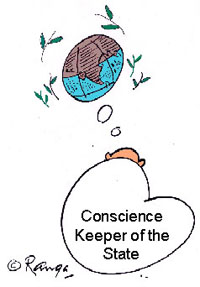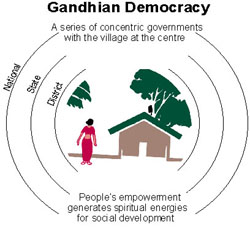| Political Crisis in Nepal: who is in the wrong ? SK Sharma T he King of Nepal is being widely criticised for dissolving the duly elected parliament and assuming dictatorial powers. Unfortunately, most people do not understand what has provoked the educated youth of Nepal, like those of India, to take to arms under the banner of the Maoist movement, and how it can be resolved. and assuming dictatorial powers. Unfortunately, most people do not understand what has provoked the educated youth of Nepal, like those of India, to take to arms under the banner of the Maoist movement, and how it can be resolved. Nepal is the only Hindu state in the world, but not a theocratic state. All faiths of Indian origin, Hinduism, Buddhism, Jainism and Sikhism as well as Bahai faith that originated in Iran, are henotheistic in the sense that they believe in sarva dharma sambhaav, that is, respect for all faiths, whereas Western secularism is mere tolerance of other faiths. Further, according to Hindu scriptures such as Manu Smriti reiterated in Mahabharat, the dharma of the state is to allow every local entity to handle all local matters such as administration of justice, police, education, healthcare, land, water systems and forests, and demand not more than one-sixth of local revenues for higher level functions and coordination. Symbolised in Ram Raj, Gandhi called it Gram Swaraj. During King Mahendra’s reign, Nepal was largely governed in this manner and the people were happy. Buddhist Bhutan too is presently being governed somewhat in this manner. Based on the Town Hall democracy of the European settlers, US democracy is similar in the sense that when the town joined to form the states, they assigned those functions to the states that they themselves could not handle. When the states federated, Jefferson could assign only residual function to the national government. However, because of large land holdings usurped by the settlers from the indigenous people, USA has become highly capitalist. Unfortunately, when India attained independence, the desire of the then leadership to centralise power led to the partition of India, assassination of Gandhi, and the all round political, economic, environmental and social degradation witnessed today. In 1991, the politicians of Nepal pressuriz\sed their King to institute democracy as in India, based on the faulty Westminster system and exploitative colonial institutions —- centralised, non-transparent and bureaucratised. Deprived of their democratic rights and suffering at the hands of self-seeking politicians, the educated youth of Nepal have taken to violence. The methods adopted by the Maoists of Nepal, ULFA, NAXAL and PWG of India and Tamil Tigers of Sri Lanka are wrong, but their demand for local control over local resources is right. Once true democracy is instituted, they will join the mainstream of society for nation building. To facilitate this, People First has conceptualised that contemporary democracy needs another institution, Sovereign Rights Commission with authority to direct referendums except on issues fundamental to democracy or the integrity of the nation. Superior to the royal priest of bygone days, more like Gandhi, it will function as the non-corruptible conscience keeper of the state based on the values of the society as a whole. It, will be based on the wishes expressed by the people, prepare a proposed Constitution and refer the present versus the proposed Constitution to the people through referendum. The people will overwhelmingly vote in favour of the latter. The Commission will then authenticate it, this time truly in the name of the people as the supreme law of the nation. It will then appropriately phase the reforms and monitor that they are properly instituted. The world will then become a confederation of self reliant local governments leading to the emergence of a just world order. q |
 Rajiv Gandhi initiated such reforms in India. We are grateful to him for it. However, after his unfortunate assassination, the political leaders, reluctant to let go power, dilly-dallied for several years and finally promulgated the Panchayati Raj constitutional amendments that retain effective power with the state and have only decentralised corruption! Big brother India that initiated this blunder has the moral responsibility to institute truly democratic reforms as advocated by Gandhi through the referendum process.
Rajiv Gandhi initiated such reforms in India. We are grateful to him for it. However, after his unfortunate assassination, the political leaders, reluctant to let go power, dilly-dallied for several years and finally promulgated the Panchayati Raj constitutional amendments that retain effective power with the state and have only decentralised corruption! Big brother India that initiated this blunder has the moral responsibility to institute truly democratic reforms as advocated by Gandhi through the referendum process.